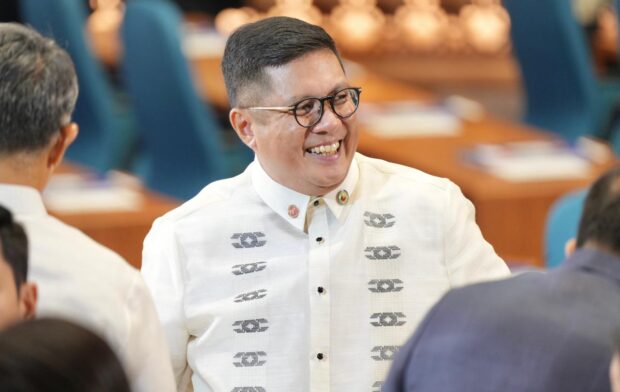
Bicol Saro party-list Rep. Brian Raymund Yamsuan. INQUIRER FILES
WASHINGTON, DC — Bicol Saro party-list Rep. Brian Raymund Yamsuan has urged fellow lawmakers to prioritize cybersecurity-related bills as President Ferdinand Marcos Jr. had already issued a national plan on the topic.
Yamsuan in a statement on Tuesday said that the bills pending with Congress—like House Bill (HB) No. 8199 or the proposed Critical Information Infrastructure Protection Act should be pushed after the creation of Executive Order (EO) No. 58.
EO No. 58 directs government agencies and government-owned and controlled corporations to adopt the National Cybersecurity Plan (NCSP) 2023-2028, which is basically a “whole-of-nation road map for the integrated development and strategic direction of the country’s cybersecurity”.
READ: Marcos okays 6-year cybersecurity plan
Fortify cyber defense
“The National Cybersecurity Plan adopted by the President, complemented by strengthening multilateral ties with our allies and passing pending bills in Congress that aim to transport our country safely into the digital era will help fortify our defenses against increasing cyberthreats and other intrusions,” Yamsuan said.
According to Yamsuan, HB No. 8199—which he is a co-author of—would complement the NCSP if it is enacted.
Under EO No. 58, the NSCP will address the need for operational guidelines that would ensure a secure and resilient cyberspace for Filipinos, and to respond to the importance of an assessment on the “vulnerabilities and risks of the country’s cybersecurity”.
Yamsuan said that HB No. 8199 meanwhile can be a starting point for the Department of Information and Communications Technology (DICT) in implementing the NCSP.
READ: Romualdez calls for probe into hacking attempts of government websites
Ncert
Under the bill, the National Computer Emergency Response Team (Ncert) will be assigned as the official government arm in terms of having a centralized reporting mechanism for cybersecurity incidents.
“The NCSP outlines a whole-of-nation roadmap aimed at strengthening the security and resilience of the country’s cyberspace, while HB 8199 prescribes security measures to critical information infrastructure (CII) institutions to protect their digital assets from risks, threats and attacks,” Yamsuan said.
“This measure complements the NCSP and is a good jump-off point in accomplishing one of the Plan’s primary objectives, which is to ensure convergence among all government agencies in protecting our country from cyberattacks,” he added.
Aside from HB No. 8199, the lawmaker also mentioned other bills are important to the NCSP, like HB No. 7393 or the proposed Anti-Financial Account Scamming Act; HB No. 9888 or the Financial Literary and Fraud Prevention for Workers bill; and HB No. 7976, which seeks to define online fraud as a form of economic sabotage.
HB No. 7393 was approved by the House on third reading last March 2023; HB No. 9888 is pending with the House committee on labor and employment since February 2024; and HB No. 7976 has been pending with the House committee on information and communications technology since March 2024.
According to Yamsuan, it would also bode well for the Philippines if President Marcos can discuss with Japanese Prime Minister Kishida Fumio and United States President Joe Biden cybersecurity issues when the three heads of state hold a trilateral meeting this Thursday (Eastern time).
READ: Customs bureau latest gov’t victim of hackers
READ: 2 terabytes of DOST data breached in latest hacking incident
Hacking incidents
The call from Yamsuan came after successive hacking incidents on government websites. On Monday, the DICT confirmed that they are probing the extent of the data leak that has affected the Bureau of Customs (BOC).
Initial assessments from cybersecurity group Deep Web Konek showed it is possible that 4.5-gigabytes worth of BOC data was compromised by hackers.
Then last April 3, DICT said that around two terabytes of data belonging to the Department of Science and Technology were feared to be leaked, in what is described as the biggest hacking incident under the present administration.
Several officials including House Speaker Ferdinand Martin Romualdez have called for investigations on hacking incidents on several government websites. Romualdez made the call last February, when DICT said they traced back attempts to hack the Overseas Workers Welfare Administration to an internet protocol (IP) address located in China.